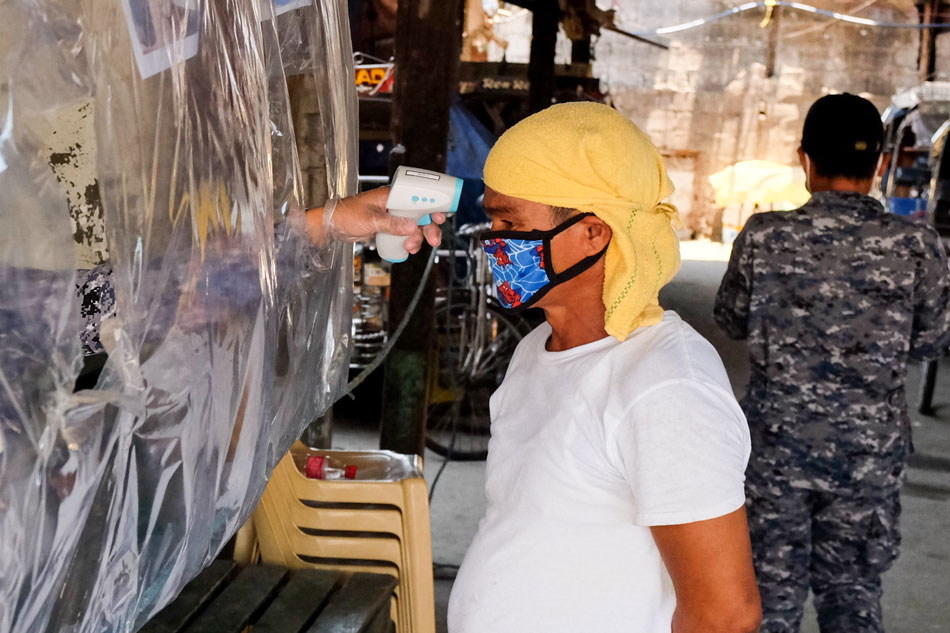Not 'pasaway,' many Filipinos OK with COVID-19 measures: online survey | ABS-CBN

Welcome, Kapamilya! We use cookies to improve your browsing experience. Continuing to use this site means you agree to our use of cookies. Tell me more!
Not 'pasaway,' many Filipinos OK with COVID-19 measures: online survey
Not 'pasaway,' many Filipinos OK with COVID-19 measures: online survey
Christian V. Esguerra,
ABS-CBN News
Published Jun 23, 2020 04:00 PM PHT
MANILA -- An online survey of predominantly middle-class Filipinos showed a "high level" of compliance with one of the world's longest coronavirus lockdowns and other safety protocols, but "little confidence" in the country's health care system to deal with the pandemic.
MANILA -- An online survey of predominantly middle-class Filipinos showed a "high level" of compliance with one of the world's longest coronavirus lockdowns and other safety protocols, but "little confidence" in the country's health care system to deal with the pandemic.
Most of the respondents said they would agree to be isolated for 3-4 weeks should they contract COVID-19, or be placed under quarantine "even if healthy and knowing" that none of their close contacts had the disease, according to the study by the National Research Council of the Philippines.
Most of the respondents said they would agree to be isolated for 3-4 weeks should they contract COVID-19, or be placed under quarantine "even if healthy and knowing" that none of their close contacts had the disease, according to the study by the National Research Council of the Philippines.
"They have very positive attitudes. They were favorable toward being quarantined for whatever reason," said Dr. Maria Cecilia Gastardo-Conaco, who presented the results of the study on sentiments and behaviors during the health crisis in an online forum Tuesday.
"They have very positive attitudes. They were favorable toward being quarantined for whatever reason," said Dr. Maria Cecilia Gastardo-Conaco, who presented the results of the study on sentiments and behaviors during the health crisis in an online forum Tuesday.
"They seem to be taking this quite seriously and complying with the preventive behaviors for COVID."
"They seem to be taking this quite seriously and complying with the preventive behaviors for COVID."
ADVERTISEMENT
Measures included staying home unless they needed to go out for essential errands, wearing face masks outside, practicing physical distancing, frequent use of hand sanitizers, and boosting their immune system with vitamins and nutrients.
Measures included staying home unless they needed to go out for essential errands, wearing face masks outside, practicing physical distancing, frequent use of hand sanitizers, and boosting their immune system with vitamins and nutrients.
Governors and mayors were found to be the most trustworthy among government officials in providing information about the health crisis, according to the April 25 to May 25 survey of 288 respondents nationwide.
Governors and mayors were found to be the most trustworthy among government officials in providing information about the health crisis, according to the April 25 to May 25 survey of 288 respondents nationwide.
Pasig Mayor Vico Sotto was perceived to be the "most effective" followed by Vice President Leni Robredo, and President Rodrigo Duterte, who also enjoyed a high level of trustworthiness.
Pasig Mayor Vico Sotto was perceived to be the "most effective" followed by Vice President Leni Robredo, and President Rodrigo Duterte, who also enjoyed a high level of trustworthiness.
Of the government officials mentioned in the survey, only Secretary Salvador Panelo, a former Malacañang spokesman criticized for a number of gaffes while speaking about COVID-19, ranked below the midpoint in the trust category.
Of the government officials mentioned in the survey, only Secretary Salvador Panelo, a former Malacañang spokesman criticized for a number of gaffes while speaking about COVID-19, ranked below the midpoint in the trust category.
The study showed that there was worry as well as fear among the respondents at the start of the outbreak, with such feelings rising when the government declared the Luzon-wide lockdown. They later went down when the enhanced community quarantine was extended.
The study showed that there was worry as well as fear among the respondents at the start of the outbreak, with such feelings rising when the government declared the Luzon-wide lockdown. They later went down when the enhanced community quarantine was extended.
"There wasn't much anger... and that anger didn't seem to be affected by the stages in the pandemic. That's also an interesting thing to think about," said Conaco.
"There wasn't much anger... and that anger didn't seem to be affected by the stages in the pandemic. That's also an interesting thing to think about," said Conaco.
She acknowledged that some of the feelings expressed by the respondents might have been connected their level of confidence in the ability of the Philippine health care system to handle the pandemic.
She acknowledged that some of the feelings expressed by the respondents might have been connected their level of confidence in the ability of the Philippine health care system to handle the pandemic.
"They did not seem to have much confidence," she said.
"They did not seem to have much confidence," she said.
Read More:
COVID-19
lockdown
quarantine
ECQ
GCQ
National Research Council of the Philippines
Maria Cecilia Gastardo-Conaco
ADVERTISEMENT
ADVERTISEMENT


